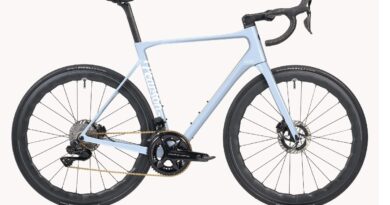Germany bike sales pick up after sluggish start while eBike exports boom
Buying restraint and poor weather hampered Germany bike sales but incoming dry weather has seen numbers pick up considerably, according to the ZIV Zweirad-Industrie-Verband (Bicycle Industry Association).
Releasing the numbers in the count-down to Germany’s internationally-focused Eurobike, ZIV also noted an uptick in foreign trade. Q1 2023 saw 260,000 bicycles were exported, 14% up on Q1 2022. eBike exports stood out, at 190,000 units, 56% more than Q1 2022.
With a total of 28% growth compared to the first quarter of 2022, customers outside Germany “represent a reliable and growing sales market for German bicycle and parts production” said ZIV. The majority of exports from German bicycle and eBike production go to EU and EFTA countries (share in 2022 98% for e-bikes and 93% for bicycles).
Imports in the first quarter totalled 680,000 bicycles and 350,000 eBikes. This is an increase of 2.3% and 12.7% respectively compared to the same period last year. Overall, imports in the first quarter grew by 5.6% year-on-year.
Production and sales
eBike production was broadly similar to boom year 2022: In the first five months production was 1,050,000, around 5% higher than 2022. With Germany making less ‘standard’ bicycles than eBikes these days, ‘standard’ bicycle production was 450,000 and perhaps a telling 10–15% below the previous year’s figure.
Economic gloom and poor weather saw significantly weaker Germany bike sales figures up until mid-May. For the first five months of 2023, ZIV is forecasting sales of eBikes to be 850,000 units (down 12%). The ‘standard’ bicycles figure is 830,000 units, down 20% on the first five months of the previous year.
With the change in weather, sales increased massively from mid-May. June has also been very strong so far.
“In view of the ongoing war in Europe, with inflation, a general reluctance to buy and very bad weather, we expected the market to be gloomy in the first few months of 2023,” says Burkhard Stork, CEO of ZIV. “It is therefore all the more pleasing that the anticipated decline in bicycle sales, and especially e-bikes, was less severe throughout Germany from January to May compared to the strong results in the same period last year, and that exports were able to increase considerably in the first quarter.”
Full-year outlook: very heterogeneous
ZIV has wisely pointed out that predicting how the full year will fare has rarely been as difficult.
“We confer closely with the companies and are currently seeing very heterogeneous situations, sales figures and expectations,” says Burkhard Stork. “There is a general consensus that quality and innovation ‘Made in Germany’ will remain a stable strong driver, especially in the eBike market, and that the bicycle and e-bike market will develop very well in the medium and long term,” emphasises Stork. Nevertheless, the current year will probably remain challenging for the bicycle industry, said ZIV, forecasting sales of around 2 million eBikes for 2023. That would be about 10% less than in the peak year 2022 with 2.2 million units.
Twin challenges for the German (and other) cycle industries
In Germany, as in other nations, the medium prospects are strong for the cycling industry. As in Germany, political will can be an obstacle – as well as staff shortages.
Germany’s eBike production has increased by a wh9opping 70% since 2019 and sales have nearly doubled from 4 billion euros in 2019 to 7.36 billion euros in 2022. This development is now expected to pick up speed again. It is already foreseeable that this will greatly exacerbate the problem of staff recruitment, said ZIV.
Burkhard Stork, CEO ZIV: ” Our member companies already made it clear before the Covid-19 pandemic that the shortage of skilled workers is a major problem. This problem has since become far more acute. Companies in the bicycle industry unanimously report significant difficulties across all qualification levels in recruiting staff. As an association, we organise the joint efforts of the industry. We expect policymakers to support us and to take appropriate countermeasures.”
The 2020 federal budget marked the start of Germany’s biggest ever bike path construction offensive. Federal Transport Minister Wissing has secured the necessary funds until 2028. The ZIV expressly warns against making cuts to this in the budget negotiations that are currently underway. At the same time, the coalition agreement promises urgently needed changes in German road traffic legislation.
Burkhard Stork, CEO ZIV: “The federal government’s bike path offensive needs to remain reliable. Thousands of municipalities in Germany are working hard to build bike paths and develop their bike path networks. These processes cannot be completed overnight. Hence municipalities need reliability and a clear commitment that the projects being tackled now can also be financed in a few years’ time. Investments in cycling have high benefits and are comparatively cheap – so it would be counterproductive to now cut back on these investments.”
If you’re looking for market data for the UK cycling industry, then you can take a look at CyclingIndustry.News’ latest market report.



